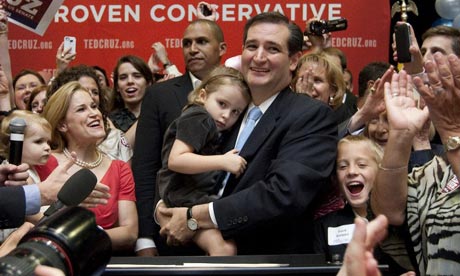I have written about gerrymandering before, but the issue is back to the fore because numerous commentators have posited a link between gerrymandering and the shutdown. Gerrymandering is now commonly given as the reason why congressional districts appear to be producing more conservative and/or Tea Party-allied Republican representatives.
I still believe the supposed effects of gerrymandering on political polarization in the House of Representatives are being overstated. And fine work from Nate Cohn and Sean Trende explains the point very well. I just have one more thing to add to the argument: what about Ted Cruz?
Texas Senator Ted Cruz is seen as a figurehead for Tea Party conservatives. It's even been reported that House Republicans have been taking directions from him in refusing to pass a clean continuing resolution without defunding or delaying Obamacare. So did gerrymandering create Ted Cruz, too?
The answer, of course, is no. Ted Cruz was elected to the United States Senate; he has never served in the House. Senators are voted for in state-wide elections, which means that redistricting and gerrymandering logically can't apply. Yet, Cruz is as conservative as, if not more conservative than, the House GOP members who, many believe, are keeping the government shut down and flirting with debt default.
Admittedly, Ted Cruz is just one elected official, but he's played a larger-than-life role in the current crisis. And, more importantly perhaps, he is part of a larger trend in the United States Senate, in three ways.
First, Cruz is from the state of Texas. And Texas is a deep red state, which makes it characteristic of a pattern of states becoming more polarized. As I've noted before, there used to be a great many states that were very competitive in national elections. In 1976, almost half the states in the union came within 3pt of the nationwide vote in the presidential election. A more impressive 30-plus states were within 5pt. Today, the numbers aren't even close to that.
There were only eight states that came within 3pt of the national vote in the 2012 presidential race. That number only rises to ten when we include states where the margin was within 5pt of the nationwide margin – only a third of the number there were in 1976. Even if you expanded the list to include those within 10pt, you'd still only get to 14 states.
It's fairly clear, then, that people are "self-sorting" on the state level. As Sean Trende shows, this filters down to the congressional district level rather well. The number of districts that most would call "competitive" under even the Democratic-written district lines of the 1990s would have been about the same.
Second, Cruz's election was one of many where voters decided that they wanted their senatorial vote to reflect their presidential vote. Just 20 years ago, a similar party allocation in the Senate featured many more blue state Republicans and red state Democrats. In 1993, 49% of the Democrats' Senate caucus came from states that had voted more Republican than the nation as a whole in the prior presidential election. That percentage has been cut in half, to only 25% in 2013.
It's the same story with the Republican Senate caucus. Republicans from blue states were 28% of the Senate Republicans in 1993. Today, the percentage is only 16%.
So, what we have is increased polarization in the voting patterns of states on the presidential level, which has translated down to the senatorial level. Note, as Nate Silver has shown, this is the same phenomenon that is occurring on the congressional district level – even when controlling for changing districting lines.
The third factor is that the increased polarization of the states seems to be reflected in the senators' voting records. The Senate (as well as the House) is now more polarized than it's been in the past 135 years. How do we know?
The people over at Voteview score each roll-call vote: -1 is most liberal, while +1 is most conservative, per Voteview's "DW nominate" score. They then were kind enough to map the average difference between the Senate's Democratic and Republican caucus. This shows that there have been increasing differences in the average voting scores of the Republican and Democratic Senate caucuses, respectively, since the 1976 election. The polarization accelerated after the 1992 election.
It's simply not possible that gerrymandering was the sole cause of this trend. It's not as though anyone can, all of a sudden, start moving around state lines.
Now, none of this is to say that gerrymandering isn't responsible for some part of the polarization in Washington. The median Democratic and Republican House district is more polarized than the median Democratic and Republican Senate seat. The House caucuses have more extreme voting records than the Senate's. Some of that is, again, due to self-sorting on the state level more locally, but not all of it can be accounted for that way.
The Senate shows, however, that the sharp upswing in polarization we see today is largely the product of natural voting patterns. And these manifest themselves on the state level without any gerrymandering. Texas put Ted Cruz in the Senate not because someone redrew Texas' state lines, but because Texas voters became, on average, more conservative.









